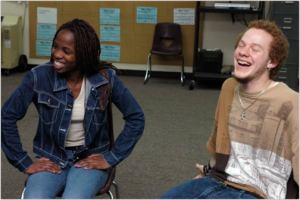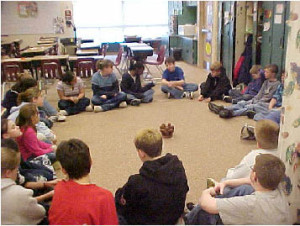News & Announcements
- Details
- Written by Joshua Wachtel
In Philadelphia, The Campaign for Nonviolent Schools, a citywide, youth-led campaign, is planning an afternoon event titled Ending Violence Through Schools. Workshops include Implementing Restorative Practices, Interrupting Bias Violence, Creating Nonviolent Schools and Ending the School to Prison Pipeline.
The event takes place on Martin Luther King Day, Monday, January 16th, from 1 to 4pm, at Arch St. Methodist Church, 55 N. Broad St, Philadelphia. Pre-register for the event here: www.endingviolence.eventbrite.com
- Details
- Written by Joshua Wachtel
Here's a video showing a multi-faceted Restorative Juvenile Justice Project in Peru. People involved in a wide variety of aspects of the project have been interviewed and there's some striking footage of the country. Jean Schmitz, director of the Latin American Institute of Restorative Practices, an IIRP affiliate, appears briefly. This 14-minute video is in Spanish with English subtitles.
- Details
- Written by Joshua Wachtel
Here's a piece about schools in Scotland, where the number of exclusions (suspensions and expulsions in US parlance) is decreasing. The article quotes Ann Ballinger, general-secretary of the SSTA, Scotland’s second-largest teaching union:
“Restorative justice, staged intervention and the use of organisations like SkillForce have produced gratifying results in a number of establishments, enabling young people to learn appropriately and teachers to work in a calm and supportive environment” ...
- Details
- Written by Joshua Wachtel
I'll be slowing down on posting during the holidays, but I may do quick posts with links to interesting pieces like this one for those who continue to check in. Here's a very personal story about a mediated dialog between a victim of rape and her rapist. Click here: Restorative justice in a case of serious sexual assault — RJ Online.
- Details
- Written by Joshua Wachtel
 Deanna L. Webb earned a Master of Restorative Practices and Education in June 2009 at the International Institute for Restorative Practices (IIRP) Graduate School, through the one-year FastTrack program. She is an eighth-grade special education teacher at a middle school in Easton, Pennsylvania, USA.
Deanna L. Webb earned a Master of Restorative Practices and Education in June 2009 at the International Institute for Restorative Practices (IIRP) Graduate School, through the one-year FastTrack program. She is an eighth-grade special education teacher at a middle school in Easton, Pennsylvania, USA.
When I graduated from college with a degree in special education, I was prepared to offer students specially designed instruction, program modifications and a variety of teaching techniques to match their individual learning styles, as well as tools and techniques they could use to be successful with academics. What I was not prepared for, however, was the need to fill in the blanks in their lives that were not a part of the typical academic school environment. This became especially evident when I began teaching in the emotional support setting. My students all lacked a sense of community, and consequently they also lacked a sense of accountability. During my first few years as a teacher in this setting, I struggled to connect with students and to keep them engaged in the school environment. Some students did very well, but I was unable to reach others. The tools I acquired in IIRP classes and then used in my classroom allowed me to build community and teach accountability and respect to a very challenging population of students.
- Details
- Written by Pam Thompson
 Circles are a great tool for dealing with holiday stress. In a "talking circle," one person speaks at a time, and everyone has a chance to speak and be heard.
Circles are a great tool for dealing with holiday stress. In a "talking circle," one person speaks at a time, and everyone has a chance to speak and be heard.
At CSF Buxmont, we start holding circles to talk about the holidays shortly before Thanksgiving. Some go-around questions include:
- What is your favorite holiday memory?
- What are some of your holiday traditions?
- Who do you celebrate with?
- What are some of your concerns about holiday time?
- What are you worried about for the holidays?
- What would your ideal holiday celebration look like?
- Details
- Written by Joshua Wachtel
 Here's a followup to last week's news that a 9-year-old boy was suspended for calling his teacher "cute." From a blog post at Education News which has all the details (click here):
Here's a followup to last week's news that a 9-year-old boy was suspended for calling his teacher "cute." From a blog post at Education News which has all the details (click here):
[A]fter a district investigation, officials have found that Emanyea [the boy] did nothing wrong. The school board then gave principal Jerry Bostic the option to resign or have his contract terminated.
Bostic, who had been working for 44 years, said:
"I didn’t show a history of making problems like that. I’ve had the best of evaluations my entire career and because of some syndicated columnist in New York or California, I don’t have a job. ...
"I admit I made some errors in what I did, but to fire me or to demote me with 44 years in it, it just doesn’t make sense. ..."
- Details
- Written by Joshua Wachtel
 Congratulations to IIRP alumna Mary Ellen Mannix, for her recent online radio interview, in which she explains James's Project – jamessproject.com. According to the web site, Mannix's son "James was diagnosed prenatally with a minor congenital heart defect. Despite this advantage he lost his life at eleven days of age due to a variety of preventable medical errors and poor communication in his medical care."
Congratulations to IIRP alumna Mary Ellen Mannix, for her recent online radio interview, in which she explains James's Project – jamessproject.com. According to the web site, Mannix's son "James was diagnosed prenatally with a minor congenital heart defect. Despite this advantage he lost his life at eleven days of age due to a variety of preventable medical errors and poor communication in his medical care."
Now Mannix has launched James's Project, the mission of which "is to find, support and help work that protects infants in their first year of life. James’s Project aims to reduce infant mortality by focusing on patient safety isssues that affect the start of life. Our tools are education, communication and collaboration." ... "Creating effective communication strategies and opportunities in healthcare is critical to improving the system. It can help save lives. James’s Project safe guards the physical, emotional, and familial growth during the first year."
- Details
- Written by Joshua Wachtel
 “Before we had circles we didn’t feel like our voices mattered. Now the violence and fighting have stopped. We all come together. A lot of us want to change the world.” —A 15-year-old Bengali girl at Hamtramck High School, in Hamtramck, Michigan, USA
“Before we had circles we didn’t feel like our voices mattered. Now the violence and fighting have stopped. We all come together. A lot of us want to change the world.” —A 15-year-old Bengali girl at Hamtramck High School, in Hamtramck, Michigan, USA
The above is from a student interview in a new article, "Restorative Practices: Giving Everyone a Voice to Create Safer, Saner School Communities," by Laura Mirsky, in the new issue of The Prevention Researcher, a quarterly US journal that focuses on successful adolescent development and serves professionals who work with young people.
- Details
- Written by Joshua Wachtel
This piece struck me as interesting because it specifically discusses the possibility of using restorative justice to resolve juvenile hate crimes. It even quotes a youth who specifically says he would have liked to have talked with the offender to get questions answered and to correct misinformation. Are criminal justice systems truly listening to the voices and needs of victims?
On Monday, celebrity chef, Tony Singh was in Leith - one of the most culturally diverse areas of the capital - to support the juvenile hate crime scheme that aims to stamp out crimes motivated by prejudice against race, disability, religion or belief, sexual orientation and transgender people.

Restorative Works Year in Review 2024 (PDF)
All our donors are acknowledged annually in Restorative Works.
